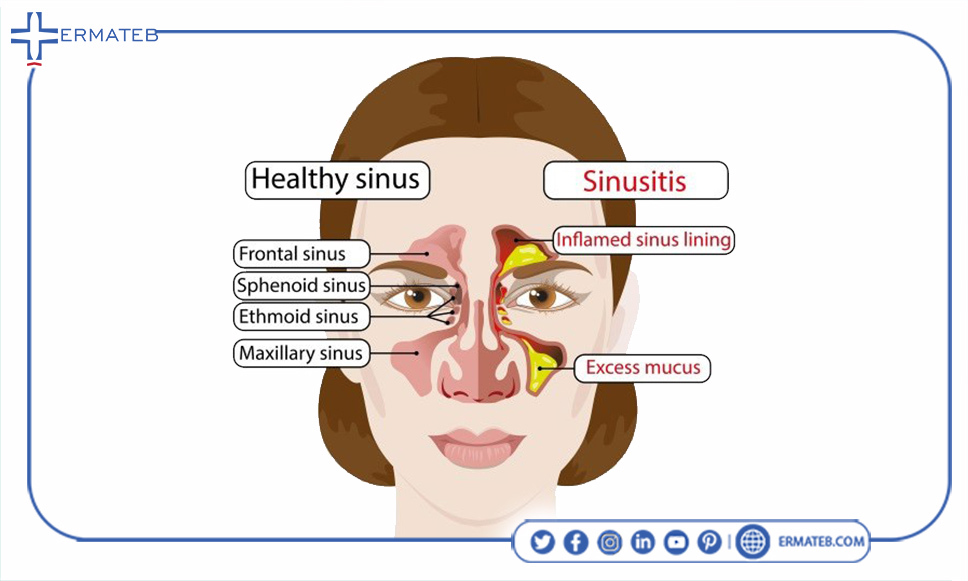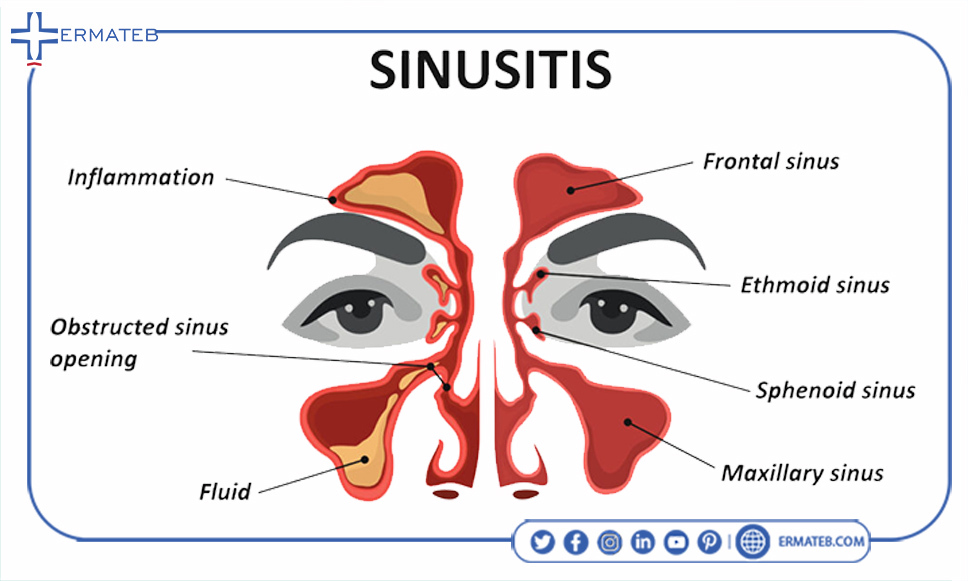
You can find the answers to the following questions in this article:

Sinusitis or sinus infection is a condition in which the tissues lining the sinuses inflame or swell. It's important to know what sinuses are? Sinuses are four pairs of cavities that are connected by narrow channels. The tissues inside of each sinus produce mucus that drains out of the nose. This drainage makes the channels and nose clean and free of any microorganisms. In normal conditions sinuses are filled with air but if they will be blocked by different reasons fluid can be accumulated in the cavities. The accumulated fluid is a perfect place for various microorganisms like bacterias to grow and cause infection. If this happens we call it bacterial sinusitis.
This is sometimes called rhinosinusitis, that “rhino” meaning “nose.” The nasal tissue is almost always swollen if sinus tissue is inflamed.
What are the different types of sinuses near the nose and eyes?
As it was mentioned before there are four pairs of cavities in your scalp near the nose and eyes. These sinuses are called by the name of bone structures that embraced them.
These are paranasal sinuses:
The biggest sinus is the maxillary and because of its location, the possibility of infectious sinusitis is higher.
What are the different types of sinusitis?
If you want to know more about Rhinoplasty and Different types of Rhinoplasty, can read these articles.
Although infectious sinusitis can happen to anybody, there are special conditions that can increase the chance of sinusitis like nasal allergies, nasal polyps, asthma, and abnormal nose structures. Some modifiable factors like smoking can increase sinus infection chance.
Sinus infection can be caused by any type of microorganisms like a virus, bacteria, or fungus that swells and blocks the sinuses. Some of the most common reasons for sinus infection are:
These are common signs and symptoms of sinusitis:
First of all your doctor will ask a series of questions to get a detailed medical history and finding out your symptoms which help diagnosis. Some physical examinations like the observation of your ears, nose, and throat are done in order to find out any swelling, draining, or blockage. In some complicated cases, you might be referred to an ear, nose, and throat (ENT) specialist. If you need an imaging exam, your specialist would order a computed tomography (CT) scan.

How simple sinusitis can be treated?
When sinusitis isn't monitored by one of the above treatments, a CT scan is used to take a better look at sinuses. Depending on the results, surgery may be needed to correct structural problems in your sinuses. This is most likely to happen if you have polyps and/or fungal infection.
Some home remedies are good for preventing sinusitis. You can wash inside of your nose with saltwater and consume medications your health provider may suggest such as allergy medications or steroid nasal sprays. If you are allergic to any substance try to avoid them like perfumes, dust, pollen, or even smoke. Wash your hands and avoid sick people to reduce your chance of getting a cold or flu.
However you can not spread your bacterial sinus infection, you can spread viruses and bacterias which caused your sinusitis.
Remember all the instructions and follow them like good handwashing practices, in order to avoid people if you are sick and to sneeze or cough into your elbow if you have to sneeze or cough.
ERMATEB'S group tries to provide a lot of necessary information in all medical and aesthetic fields. You can read them on ERMATEB'S website. After reading if you thought there are still questions and problems which are not answered in articles ask ERMATEB'S experts who answer all questions free as soon as possible. Contact ERMATEB'S professional experts who try to answer all of your questions in all medical fields as soon as possible, just contact us:
Visit our Twitter:
https://Twitter.com/Ermateben
Follow us on Instagram:
Contact us via Email:

